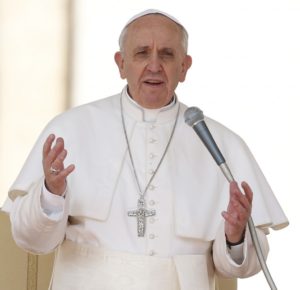Catholic Values in Higher Education
In an October 17, 2017 audience with students from the “Institution des Chartreux” in Lyon, France Pope Francis reminds them of their need to keep their moral formation at the heart of their drive to professional success and fulfillment.
“You are engaged in a course of study that prepares you to enter the great schools of commerce that, when the moment comes, will enable you to exercise a profession in the world of international finance. I am glad to know that your academic formation includes a strong human, philosophical and spiritual dimension, and for this I thank God. Indeed, it is essential that, from now and in your future professional life, you learn to remain free from the allure of money, from the slavery in which money traps those who worship it. And it is also important that you are able to acquire today the strength and the courage not to obey blindly the invisible hand of the market. Therefore, I encourage you to draw benefits from your time studying to train yourselves to be promoters and defenders of a growth in equality, artisans of a just and fitting administration of our common home, namely the world (cf. Apostolic Exhortation Evangelii gaudium, 204; 206).”
“Here in Rome you experience a form of immersion in the history that has so strongly marked the rise of the European nations. Admiring what the genius of men and the hopes they have cultivated have been capable of realising, you too must take care to leave your imprint on history. Indeed, you have the capacity of deciding your future! I wish to repeat it: you have the capacity of deciding your future. Therefore I urge you to become responsible for this world and the life of every man. Never forget that “every injustice against a poor person is an open wound, and diminishes your very dignity” (Catechesis, 20 September 2017). And, even though this world expects you to head towards success, give yourselves the means and the time to journey the paths of fraternity, to build bridges between men rather than walls, to add your stone to the edification of a more just and humane society.”
Every pope in the last century has touched on this ethic, including Pope Benedict XVI and St. John Paul II. However, I don’t think has been stated as often, and as strongly, as Pope Francis. Pope Leo XIII laid the foundation of modern Catholic social teaching with Rerum Novarum – an encyclical on capital and labor. It was published on May 15, 1891.
Earlier this week, I had an exchange with a good friend about the values in my college formation:
“Mary, When I attended Trinity, the values were academic rigor, service to society and others, and our Catholic faith as the foundation for professional and community life. We were encouraged to make an impact, to contribute. I have lived Trinity’s values all my life. Are those the same values now at Trinity?” (Note – I entered Trinity College in Washington, DC in September 1970 and graduated in May 1974.) 
Trinity was founded in 1897, so I’m sure the teaching of Rerum Novarum had an impact on the new college’s moral and ethical mission.
Especially as a graduate of a Catholic college, I was dismayed to see niche morality on display in the National Catholic Register’s (a national newspaper) 2017 Catholic Identity College Guide. The paper sent ten questions to the 197 U.S. Catholic colleges and universities to ostensibly verify Catholic identity. Of that number, 34 returned the questionnaires with the correct answers. You can get the flavor of the survey in a few of the questions:
- “Did the president make the public “Profession of Faith” and take the “Oath of Fidelity”?
- “Did all Catholic theology professors take the “Oath of Fidelity”
- “Do you exclude advocates of abortion, euthanasia, embryonic stem-cell research, cloning or advocates of the redefinition of marriage as commencement speakers and/or recipients of honorary degrees?”
- “Do you exclude sponsoring campus groups and clubs that are not in line with Catholic teaching (examples: abortion and LGBT-related clubs)? If allowed, please explain.”
- “Do you prohibit coed dorms?”
No mention of advocates of the death penalty? No mention of barring executives from companies who have endorsed or looked the other way on shoddy or criminal financial practices? Notorious polluters? Why, I wonder? Aren’t these “Life” issues?
I think it is good and needed to encourage Catholic identify in education and especially young people. Young people want to talk about what’s important or troubling them, and they want other people to hear what they have to say. We need to listen, and to encourage the exercise of their conscience, which will be their moral compass for the rest of their life–especially if they go into business.

